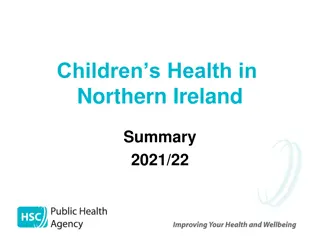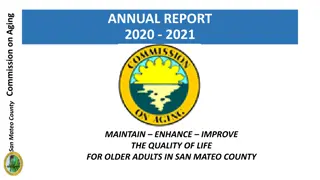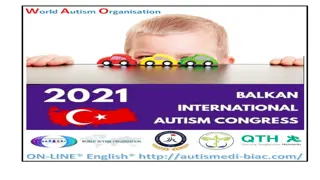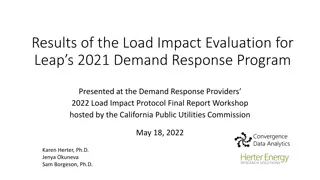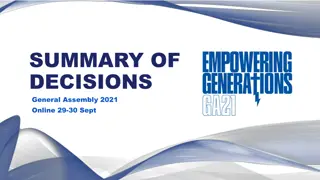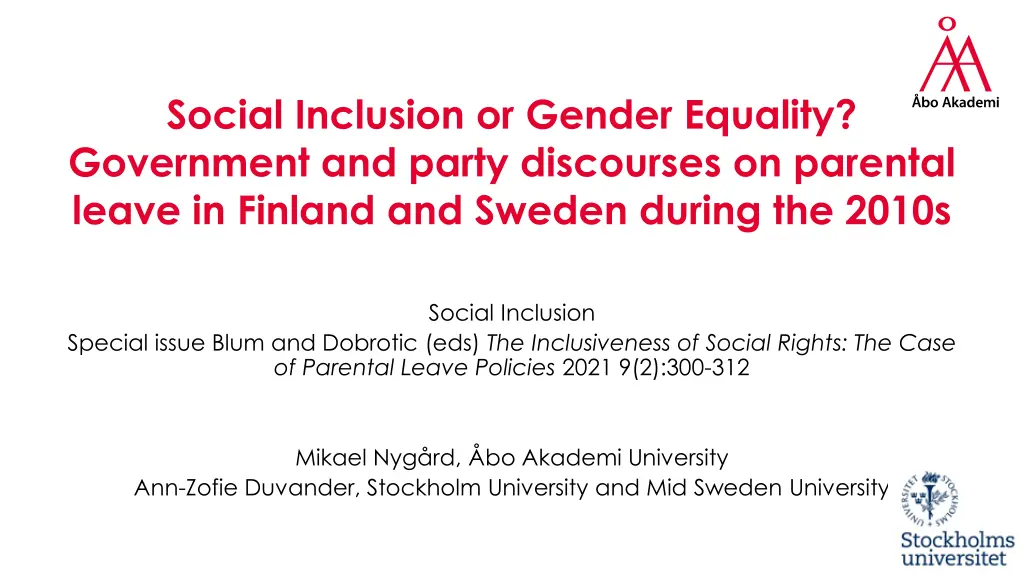
Parental Leave Policies in Finland and Sweden: Gender Equality Discourses
Explore the evolution of social inclusion and gender equality notions in Finland and Sweden regarding parental leave policies during the 2010s. Delve into ideological divisions, political party discourse, and policy changes, analyzing the role of political factors in shaping family policy development.
Download Presentation

Please find below an Image/Link to download the presentation.
The content on the website is provided AS IS for your information and personal use only. It may not be sold, licensed, or shared on other websites without obtaining consent from the author. If you encounter any issues during the download, it is possible that the publisher has removed the file from their server.
You are allowed to download the files provided on this website for personal or commercial use, subject to the condition that they are used lawfully. All files are the property of their respective owners.
The content on the website is provided AS IS for your information and personal use only. It may not be sold, licensed, or shared on other websites without obtaining consent from the author.
E N D
Presentation Transcript
Social Inclusion or Gender Equality? Government and party discourses on parental leave in Finland and Sweden during the 2010s Social Inclusion Special issue Blum and Dobrotic (eds) The Inclusiveness of Social Rights: The Case of Parental Leave Policies 2021 9(2):300-312 Mikael Nyg rd, bo Akademi University Ann-Zofie Duvander, Stockholm University and Mid Sweden University 1
Background Finland and Sweden belong to the Nordic model of welfare and have made substantial investments in social policy supporting a dual earner/dual carer model since the 1970s Yet Finland has remained a laggard in terms of both parental leave legislation that supports gender equality, and have also remained less socially inclusive in terms of diversity, that is, parental leave rights for other than different-sex parents 2
Mens share of parental leave days in Finland and Sweden 1990-2017 35 30 25 20 15 10 5 0 1990 1995 1996 1997 1998 1999 2000 2001 2002 2003 2004 2005 2006 2007 2008 2009 2010 2011 2012 2013 2014 2015 2016 2017 Share parental leave taken by men Finland Share parental leave taken by men Sweden 3
How do family policy develop and why? Structural factors and changing needs Political struggles between interests and ideologies Institutional theory emphasize for example political diffusion and path dependency 4
Research questions How did ideas of social inclusion and gender equality develop through political parties and governments during the 2010s in Finland and Sweden? Was there a ideological division in how governments and political parties politicised these ideas in relation to parental leave policy? Where there major changes in how ideas were politicised during the 2010s, and if so, did they converge in the two countries? 5
The role of political parties and ideas Observed discrepancy in parental leave legislation can partly be attributed to political factors that in turn reflect differences in how the family is viewed Politicised ideas on gender equality: equality in parental leave rights and equal leave uptake between the mother and the father social inclusion: leave rights to same-sex parents, adoptive parents, single parents, non-regular employment 6
Political parties and parental leave The literature on political partisanship and family policy have shown ideological divisions between left-wing and conservative parties regarding parental leave and childcare leave Both camps are positively disposed to supporting gender equality and work/family balance of parents, but in different ways. For instance, support state intervention (e.g. leave quotas), is in contrast to ideas on right to choose. 7
Influential ideas on parental leave The role of political parties: Formulate ideologies and programmes Seek electoral support lead to compromises and observation of new social needs In today s globalised world, policy learning (policy transfers) are likely to play an increasingly important role for the partisan constructions and positions on national parental leave policy 8
Data and methods Data: 7 government programs and 33 party programs from Finland (Social Democratic Party, the Conservatives, the Centre Party, the Finns Party, the Left Alliance, the Green Party and the Christian Democrats). 11 government declarations and 21 party programs from Sweden (Social Democrats, the Conservatives, the Centre Party, the Sweden Democrats, the Left Party , the Christian Democrats and the Liberals) Method: qualitative content analysis with a deductive design aiming to map positions of governments and parties 9
Findings: which idea dominated? During the 2010s, in both countries the idea of gender equality received more attention than social inclusion, although the latter has become more important over time. The idea of gender equality had a stronger position in the Swedish parental leave discourse, but increased strength in Finland over time. As to social inclusion, the attention was similar in the two countries and grew stronger over time 10
Findings: a partisan division? In both countries, a similar partisan division in the way the ideas of gender equality (quotas) and social inclusion (leave rights for diverse families) were politicised by parties, but also to some extent governments Whereas left-wing and green parties (and governments) supported quotas and parental leave rights for diverse families, conservative parties (and governments) were more lukewarm, with some parties directly opposing parental leave quotas (Finland: ChD, Sweden: ChD and SwD) 11
Findings: towards convergence? Political discourses on gender equality and social inclusion have to some extent converged during the 2010s. Policy development also convergence in the case of social inclusion, but Finland still lags behind in gender equality (until now?) Some evidence that supranational agencies (e.g. EU and OECD), but also Sweden as a model country have been influential for the Finnish debate, which in turn suggests that policy learning matters 12
Conclusions The Finnish and Swedish parental leave discourses on gender equality and social inclusion reflect similar divisions in terms of political parties, but over time these divides have become weaker. There is also convergence of ideas between the countries, which will be followed by a convergence also in policy >>Political partisanship, but also influential ideas and policy learning (policy transfer), matter for how parental leave policy is framed and reshaped 13
Thank you for listening! Mikael.nygard@abo.fi Ann-Zofie.duvander@sociology.su.se 14


